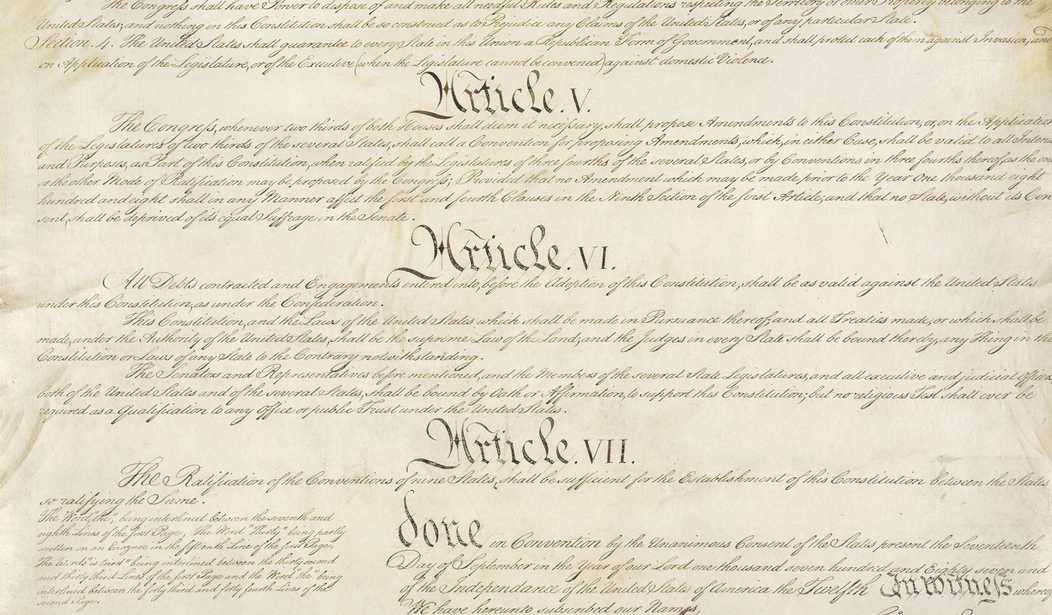Today’s humble offering may fall into the category of Preaching to the Choir. But with the midterm election less than a month out, and early voting looming over the threshold, I hope Hot Air’s alert, avid readership will bear with me.
Last night, I completed my 13th year as a judge for the Pasco County Clerk & Comptroller’s Constitution Essay Contest. The annual competition invites fifth-graders from across the Tampa Bay area county, no matter where they are schooled (public, charter, private, home) to weigh in on the prompt, “Why the U.S. Constitution is important.”
Because the essayists are fifth-graders, the contest’s several judges fret little about spelling, punctuation, and grammar. Instead, they focus on whether the author demonstrates an accurate grasp of the facts and an ability to present them in the proper context.
This, however, also bears noting: Because the essayists are fifth-graders and, thus, are somewhere between 9 and 11 years old, it stands to reason their reading on the history and philosophy behind Constitution is not particularly wide. Accordingly, what shows up on the page reflects what they have been taught — particularly, what aspects of the document were stressed by their teachers in the runup to sitting down to write.
In 2022, the emphasis apparently has been on the 3rd, 13th, and 19th amendments. For the record: No soldiers quartering in your house. No more slavery. Women get to vote. Not that these are in any way flabby, afterthought additions to the Constitution. But they never before have been so thoroughly popular with Pasco County preteens. And this I find revealing.
So, the telling-us-what-we-vehemently-agree-with part.
The Constitution was written and adopted to preserve, guarantee, and otherwise fortify the rights of the governed as laid out in the Declaration of Independence. We The People is the animating phrase for all that follows. The preamble, articles, and amendments describe authority on loan from the folks who established the document. That would be us.
It’s difficult to imagine anyone ponying up even the small handful of greenbacks necessary to become a Hot Air VIP subscriber without having precisely that originalist view of the Constitution. Our choir hears President Lincoln’s reference to the “apple of gold” framed in the “picture of silver” and murmurs, “Preach, Brother Abraham.”
But as we nod, what are we to think of young essayists who brag on the Constitution as the grantor of rights? As the document that allows us to speak freely, assemble peaceably, worship independently, own firearms, be safe from warrantless government intrusion, and have juries of our peers? As the foundational law that gives us the right to vote, to expect due process, and not be subject to cruel punishment?
Guaranteeing, preserving, and fortifying vs. granting, allowing, and giving. These are not distinctions without differences. Not even close.
At the median and impressionable age of 10, it’s hard to imagine these brave and sincere essayists are citing the Constitution as the Giver of Rights without some sort of outside influence. Somehow, somewhere, they’re learning this fundamentally flawed relationship between the citizens and the government.
Some — more than a few, actually, but hardly a majority — get it. This year’s judges were delighted to identify and celebrate a solid handful who assigned the Constitution its rightful place in the U.S. pantheon.
But we should worry about those who grow up with a flawed perspective about the source of unalienable rights, and who has claim on them. Our friends and neighbors who are not Hot Air VIP subscribers may well head out to vote still under the impression, learned in fifth grade, that government defines our rights (which is where the “right to health care” comes from).
We should worry, too, about teachers and drafters of curriculum who labor, year after year, under the same misconception.
This autumn, keep the unintended lessons of Pasco County fifth-graders in mind. The rights described in the Declaration of Independence are not tethered by government whim. The Constitution exists to preserve and fortify what descended from the Creator. Vote accordingly.
And the Hot Air VIP choir says, “Amen.”








